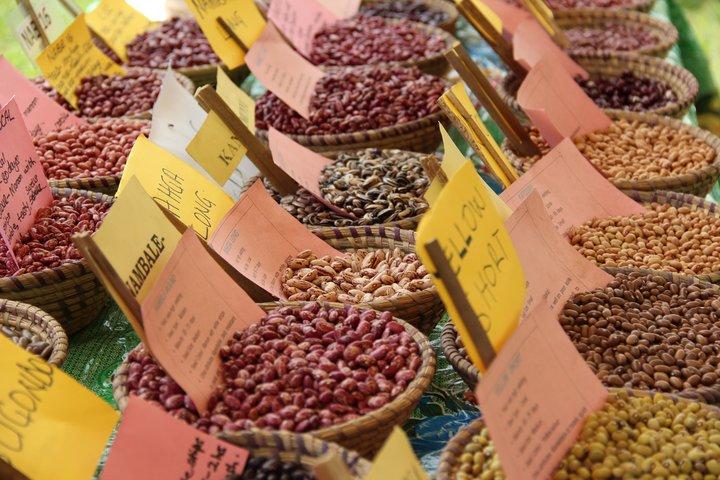Increasing access to quality and diverse seed: A journey to the Kiziba community seedbank

As the threat of climate change looms large over the agriculture sector and food security, many farmers in Uganda are beginning to appreciate the importance of seed diversity. Recently a team of farmers from Bunyoro region traveled to the Kiziba community seed bank to study how it operates and take some valuable lessons back home with them.
By Joshua Turyatemba, Communications Assistant at Bioversity International's office in Kampala, Uganda
The Kiziba community seedbank was established in 2008 as a joint effort between the farmers and scientists who were promoting the use of bean diversity as a means of controlling pests and diseases. The local community provided the land and Bioversity International and National Agricultural Research Organization (NARO) contributed by constructing the building that houses the seedbank.
The seedbank currently serves over 1000 farmers with 70 varieties of bean seed. The community initially had 13 varieties of bean seed, the other varieties were introduced from other communities in the country and some were provided by the national genebank.
The seedbank has performed very well in the last couple of years and its members have recently been trained on production of Quality Declared Seeds (QDS). As such they have obtained the QDS certification and started selling QDS-certified seeds in local areas. Because of its exemplary performance, the community seedbank is now being used as a learning platform for the creation of other community seedbanks.
Bioversity International and NARO are jointly implementing this work under the UN Food and Agriculture Organization’s benefit sharing project on 'Promoting open source seed systems of forages, legumes, millet and sorghum for climate change adaptation in Kenya, Uganda and Tanzania'. Capacity development being one of the project’s key tenets, it inspired the organization of a farmer seed fair and knowledge exchange forum.
Sixty five farmers attended the fair of which 30 were from the Bunyoro region and 35 farmers from the Kiziba community. The farmer group were drawn from different farmer associations in the Hoima district and was the second group to visit the seedbank, after the Nakaseke community seedbank which is still at an inception stage. During the visit, the Kiziba farmers shared their knowledge with their guests and provided lessons and best practices on their indigenous seed varieties, good agricultural practices for seed production, postharvest handling and storage of seed, community seedbank governance and management and in situ conservation through community seed banking.
The farmers from Hoima applauded the community seedbank and pledged to emulate it through setting up a similar project in their district. Eve Kugonza, one of the leaders of the farmer groups that took part in the tour, said that they found the concept of having many different seed varieties in one place very noble as it safeguards and protects indigenous varieties.
“We like the idea of having a variety of seeds, some of which are not even on the market. The diversity helps to cushion against household food and nutrition insecurity and provides for a wide range of diversity at the community level. The spirit of sharing the seeds freely among the group is also a good one and it promotes unity at community level,” Kugonza said.
The NARO project officer, Joyce Adokorach, while conducting a session for both teams, urged them to learn as much from each other as possible since they come from different cultures and geographic locations. She also urged the Hoima team to share the knowledge that they had acquired with the other members of their respective farmer groups.
The Kiziba community seedbank is being used as a learning platform and has also benefited over 50 farmers and researchers from Gicumbi and Bugesera Districts in Rwanda. Farmers in Masaka and Mukono in Uganda have also visited the seedbank for learning purposes.
---
This work is part of a global programme working in China, Ecuador, Morocco and Uganda on using crop varietal diversity in integrated production and pest management. It is supported by the International Fund for Agricultural Development (IFAD), the Swiss Agency for Development and Cooperation (SDC), the Food and Agriculture Organization of the UN (FAO), and the United Nations Environmental Program (UNEP) Global Environmental Facility (GEF).
In Uganda, our partners include: the Plant Genetic Resources Center of National Agriculture Research Laboratories (NARO), the Crop Protection Department of the Ministry of Agriculture, Animal Industry and Fisheries, the Ministry of Local Government, National Agricultural Advisory Services, the Mbarara and Kachwekano Zonal Agriculture Research and Development institutes, the National Agricultural Research Laboratories Kawanda, Advocates Coalition for Development and Environment, CARITAS Nakaseke and the Uganda National Farmers Federation.
This work contributes to the CGIAR Research Program on Water, Land and Ecosystems.
Photo (top): Bean seed varieties on display during the visit. Credit: Bioversity International/J. Turyatemba
Photo (bottom): A participant makes a remark during the meeting. Credit: Bioversity International/J. Turyatemba
